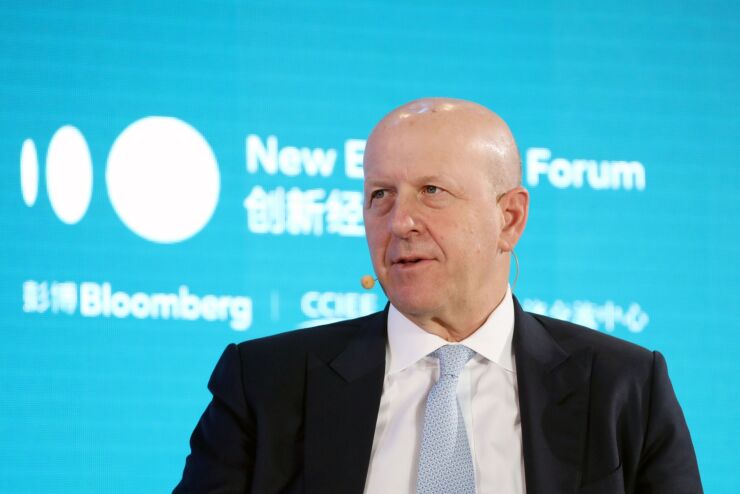
Rarely has Goldman Sachs Group worked so hard to unimpress.
The Wall Street giant has embraced a new game plan to avoid a third straight quarter of
The outcome: Analysts have slashed their estimates for quarterly profit by almost half since mid-June — the biggest revision before an earnings report under Chief Executive Officer David Solomon. That translates into one of the steepest profit drops among peers, and a return on equity that could slip below 5%.
"This is likely the worst quarter since David Solomon became the CEO," Mike Mayo, a Wells Fargo analyst, said in an interview. "There's probably half a dozen items this quarter that fall into the weak, bad or ugly category."
Over the past six weeks, Goldman has signaled a 25% slowdown in trading revenue, highlighted material markdowns in its real estate book, and said it will take a hefty write-down
The abundance of information may relieve pressure on the stock when Goldman posts results July 19. The bank's shares dropped 6% on its earnings day in January and underperformed rivals again in April — awkward moments for a firm trying to make the case that strategic missteps are behind it.
This is the "first time in quite a while they have provided some specific intra-quarter guidance," Barclays Plc analyst Jason Goldberg said. While many banks do it, Goldman typically refrains, he said. "Preparing the market for potential issues does reduce earnings-day stock volatility."
A spokesperson for Goldman declined to comment.
Analysts expect net income of $1.5 billion in the second quarter, a 48% drop from a year earlier. That compares with the 19% decline they anticipate at Morgan Stanley and jumps at Bank of America and JPMorgan Chase. The average estimate for earnings per share at Goldman is just $4.23, with some recent projections below $3.
Such figures mean that return on equity — a measure of profitability — could slide below 5%, far from the midteens target Goldman sets for itself. That would reinforce the bank's reputation for volatile results, which it had been trying to dispel by expanding into new business lines.
Executives are under pressure to show shareholders that the firm is at a turning point after Solomon

"It's obvious that there is a schism within the organization," Larry Fink, the head of BlackRock, said in a television interview last week. His firm is Goldman's second-biggest shareholder. Fink expressed support for Solomon, saying he's done a good job and elevated the bank.
Since Solomon took the helm at Goldman five years ago, the bank has boosted its book value, helped by a surge in earnings in its core Wall Street operations through the pandemic. But it has struggled to convince investors that its stock deserves a higher multiple. The price-to-book ratio, a closely tracked metric, has dropped below where it was in 2018.
The stock has slipped 7% this year and has lost 24% of its value from a peak in late 2021.
Their own missteps have been "damaging to the bank's credibility," according to John Heagerty, an analyst at Atlantic Equities. After reversing course on retail banking, Goldman has focused on its investment bank and asset and wealth management business.
"The strategy now is the right one," Heagerty said. "They should have set out on the right strategy five years ago."
Executives at the firm have been talking up the prospect of green shoots — the reopening of capital markets and relative strength in trading that should be a good omen for the stock. They will seek to highlight consistent growth in fee-based revenue from asset management and underscore that the consumer misadventures are in the past.
The fact that investors didn't bet on management's ability to execute might now prove helpful for Goldman's stock. It limits downside and offers more upside if executives succeed, according to KBW Inc.'s David Konrad. He has one of the most pessimistic estimates for second-quarter results — a mere $2 a share.
"The stock never rerated for this potential new strategy," he said. "This is a big transitional quarter."





